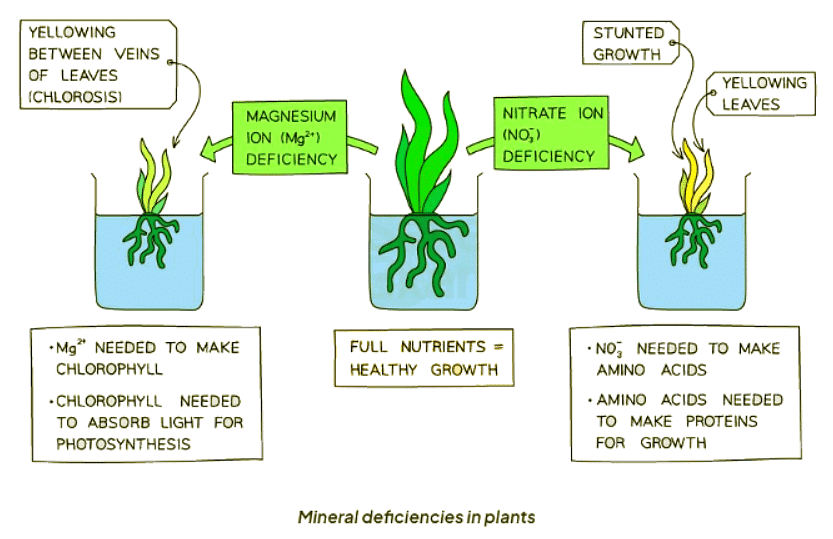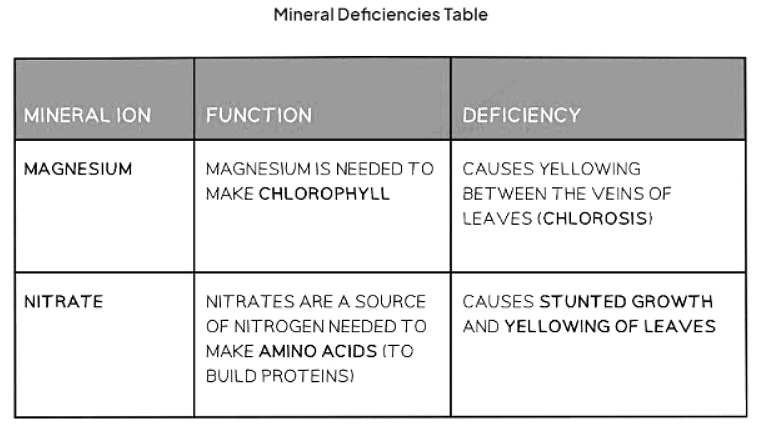Class 10 Exam > Class 10 Notes > Biology for GCSE/IGCSE > Minerals in Plants
Minerals in Plants | Biology for GCSE/IGCSE - Class 10 PDF Download
Minerals in Plants
- Photosynthesis results in the production of carbohydrates, yet plants also require various other biological molecules such as proteins, lipids, and nucleic acids like DNA.
- Since plants cannot consume food, they must synthesize these essential substances internally.
- Carbohydrates primarily consist of carbon, hydrogen, and oxygen, whereas proteins contain additional elements like nitrogen, and certain amino acids include other elements.
- Various chemicals within plants contain diverse elements; for instance, chlorophyll contains magnesium and nitrogen.
- Without a sufficient supply of these elements, plants are unable to undergo proper photosynthesis or grow effectively.
- Plants acquire necessary elements in the form of mineral ions actively absorbed by root hair cells from the soil.
- The term 'mineral' refers to any naturally occurring inorganic substance.


Question for Minerals in PlantsTry yourself: Which elements are primarily found in carbohydrates?View Solution
The document Minerals in Plants | Biology for GCSE/IGCSE - Class 10 is a part of the Class 10 Course Biology for GCSE/IGCSE.
All you need of Class 10 at this link: Class 10
|
101 videos|194 docs|33 tests
|
FAQs on Minerals in Plants - Biology for GCSE/IGCSE - Class 10
| 1. What are mineral deficiencies in plants? |  |
Ans. Mineral deficiencies in plants occur when essential minerals required for plant growth and development are lacking in the soil. This can lead to stunted growth, yellowing of leaves, and poor fruit or flower production.
| 2. How can mineral deficiencies in plants be identified? |  |
Ans. Mineral deficiencies in plants can be identified through visual symptoms such as leaf discoloration, stunted growth, and abnormal leaf shapes. Soil testing can also help determine which minerals are lacking.
| 3. What are some common minerals essential for plant growth? |  |
Ans. Some common minerals essential for plant growth include nitrogen, phosphorus, potassium, calcium, magnesium, and sulfur. These minerals play crucial roles in various physiological processes within the plant.
| 4. How can mineral deficiencies in plants be corrected? |  |
Ans. Mineral deficiencies in plants can be corrected by adding fertilizers containing the lacking minerals to the soil. This helps provide the plants with the necessary nutrients for healthy growth and development.
| 5. Can mineral deficiencies in plants affect crop yield? |  |
Ans. Yes, mineral deficiencies in plants can significantly impact crop yield. Without adequate minerals, plants may not be able to reach their full potential in terms of growth and productivity, leading to reduced crop yields.
Related Searches















